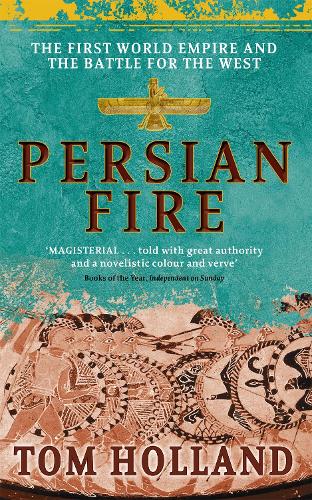
Persian Fire: The First World Empire, Battle for the West
(Paperback)
Publishing Details
Persian Fire: The First World Empire, Battle for the West
By (Author) Tom Holland
Little, Brown Book Group
Abacus
30th October 2006
3rd August 2006
United Kingdom
Classifications
General
Non Fiction
938.03
Winner of Runciman Award (for the Anglo Hellenic Language) 2006 (UK)
Physical Properties
Paperback
448
Width 126mm, Height 196mm, Spine 36mm
375g
Description
In 480 BC, Xerxes, the King of Persia, led an invasion of mainland Greece. Its success should have been a formality. For seventy years, victory - rapid, spectacular victory - had seemed the birthright of the Persian Empire. In the space of a single generation, they had swept across the Near East, shattering ancient kingdoms, storming famous cities, putting together an empire which stretched from India to the shores of the Aegean.
As a result of those conquests, Xerxes ruled as the most powerful man on the planet. Yet somehow, astonishingly, against the largest expeditionary force ever assembled, the Greeks of the mainland managed to hold out. The Persians were turned back. Greece remained free. Had the Greeks been defeated at Salamis, not only would the West have lost its first struggle for independence and survival, but it is unlikely that there would ever have been such and entity as the West at all.Tom Holland's brilliant new book describes the very first 'clash of Empires' between East and West. Once again he has found extraordinary parallels between the ancient world and our own. There is no competing popular book describing these events.Reviews
'Thrilling... masterly... gripping' INDEPENDENT ON SUNDAY 'Holland is a cool-headed historian who writes no less authoritatively and engagingly on classical Greece than he did on ancient Rome in his last book, Rubicon' THE SUNDAY TIMES 'A book as spirited and engaging as Persian Fire deserves to last... vibrant, bloodthirsty popular history, told with a rich sense of irony and irresistible narrative timing' THE TELEGRAPH 'Excellent' Sunday Times 'Incendiary stuff. Sparkling insight and no less sparkling writing' Independent
Author Bio
Tom Holland received a double first from Cambridge. He has adapted Homer, Herodotus, Thucydides and Virgil for BBC Radio. He was shortlisted for the Samuel Johnson Prize for RUBICON and won the Hessell-Tiltman Prize for History 2004.
